Brentford v Wigan Athletic, 1985 Freight Rover Trophy Final
Brentford and Wigan Athletic met at the start of June 1985 to contest the Associate Members’ Cup (or Freight Rover Trophy) Final. It was the first time the competition for Third and Fourth Division clubs had a Wembley final, with sponsors Freight Rover lending their name to the cup, which remained in place until 1987.
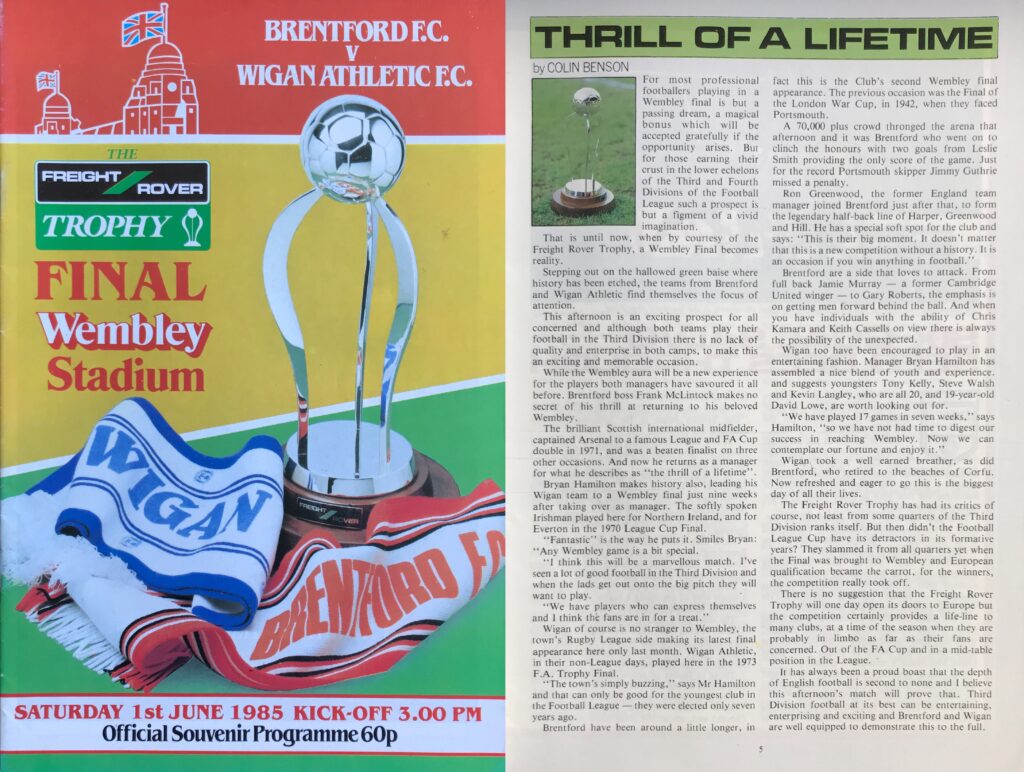
The early months of 1985 had been a grim period for English football, with violence at Luton and Birmingham followed by the tragic fire at Bradford’s Valley Parade. On 29 May, disaster struck at Brussels’ Heysel Stadium before the European Cup Final with the deaths of 39, mainly Italian supporters, and a subsequent ban on English clubs playing in European competition. The Freight Rover Trophy Final followed three days after Heysel, billed as the ‘friendly final’ between two Third Division clubs, and aimed both to boost revenue and the game’s reputation. A pre-match fund-raising game for the Bradford City Disaster Appeal Fund saw former greats such as Bobby Charlton, Bobby Moore, Geoff Hurst and George Best grace the Wembley turf and set the tone for a family-friendly atmosphere.
Each club received a 15-seat mini-bus courtesy of the sponsors on reaching the final, while guest of honour Elton John presented the trophy. The game was broadcast on satellite TV by Screensport, with Martin Tyler and Swindon manager Lou Macari commentating. Described as “the best final seen at Wembley in 1985” and “a fine advertisement for Third Division football”, the entertaining match and healthy attendance marked a first small step in English football’s rehabilitation. Buoyed by this success, the competition for clubs in the bottom two divisions of the Football League structure has continued in different guises to this day – currently as the EFL Trophy.
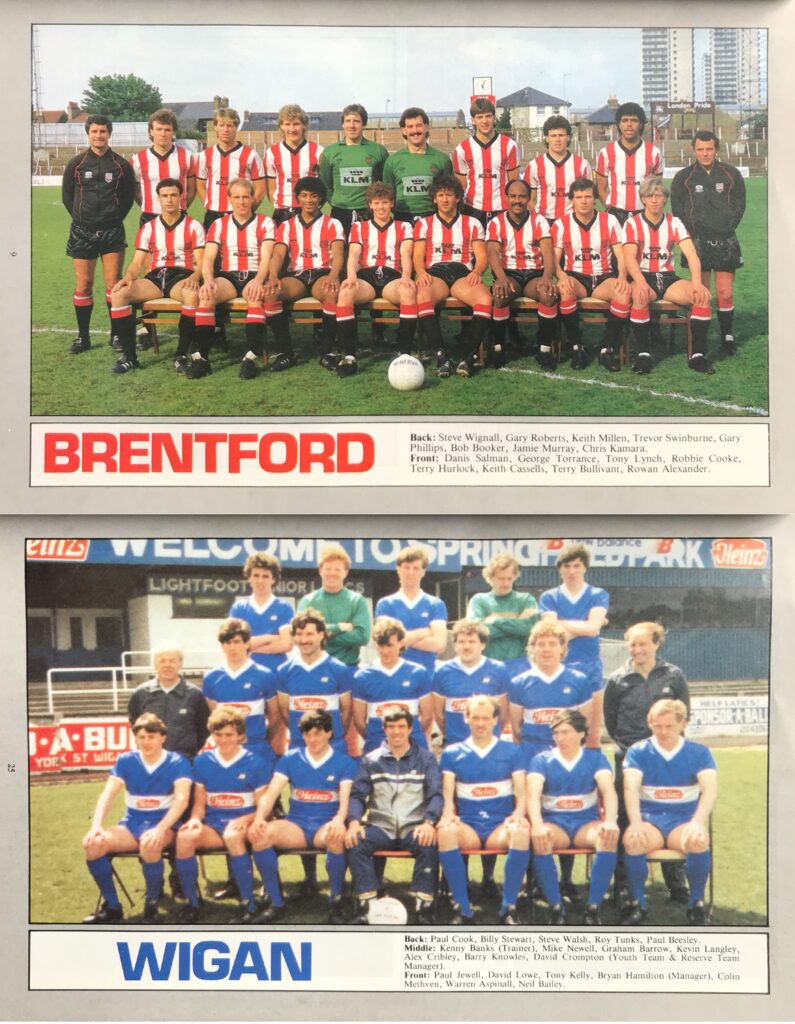
Managers Frank McLintock and Bryan Hamilton had both been prominent players in the 1960s and 70s. A Scottish international defender, McLintock lost two FA Cup Finals at Leicester, before captaining Arsenal to the ‘double’ in 1970/71 and later helping QPR to a second-place finish in 1975/76. Having briefly managed Leicester, he was at the helm at Brentford from February 1984 until resigning in January 1987 and leaving management. Hamilton won 50 caps for Northern Ireland (who he later managed) in a playing career where he represented Ipswich and Everton among others. Appointed Wigan Athletic manager in March 1985, he moved on to First Division Leicester for the 1986/87 season and had a second spell in charge of Wigan from 1989 to 1993.
Brentford captain Terry Hurlock later played at the top level for Millwall, Rangers and Southampton, also representing England ‘B’ in 1989. Alongside him in a tough-tackling midfield, Chris Kamara appeared for many clubs including Leeds and Luton in the top flight, before a broadcasting career. Long-serving versatile Bob Booker also played in the First Division for Sheffield United in his early 30s before returning to Brentford. The late Robbie Cooke was a prolific lower-league goalscorer and strike partner Keith Cassells, signed from First Division Southampton, later won this trophy with Mansfield.
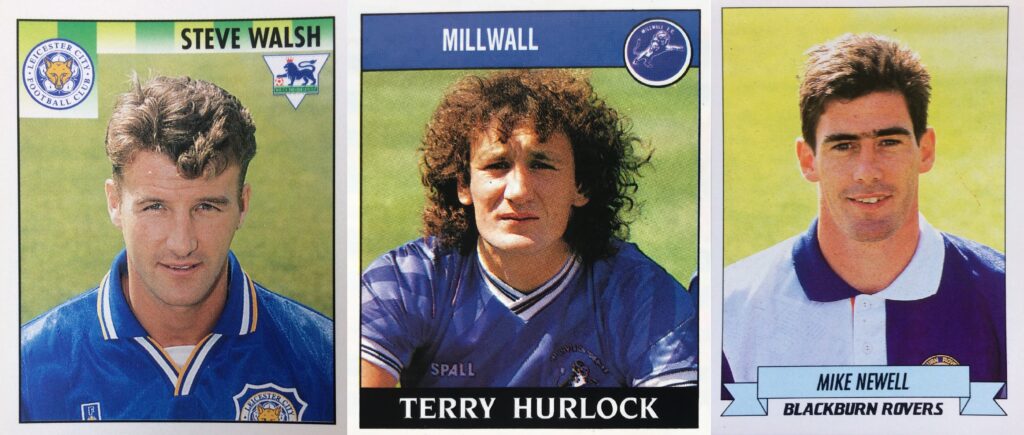
In the Wigan side, young defender Steve Walsh was making a name for himself and in 1986 followed Hamilton to Leicester, where he spent the next 14 years, captaining the side in the Premier League. Midfielder Kevin Langley made an even more dramatic move, joining Everton and contributing to their 1986/87 league title win – he went on to Manchester City and Birmingham before returning to Wigan where he set a club record for league appearances over his two spells. David Lowe and Warren Aspinall went on to top-level careers while Paul Jewell returned to the club as manager, leading them from League Two to the Premier League for the first time in 2005.
Mike Newell, scorer of the opening goal in this game, had arguably the most successful top-flight career. Moving to Luton in 1985/86, he was later signed for over £1 million by first Everton and then Blackburn, where he was part of the Premier League-winning squad of 1994/95. The following season, Newell scored the first hat-trick by an English player in the rebranded Champions League against Rosenborg – in nine minutes, a record for the competition’s fastest hat-trick which stood until 2011.
Match details for Brentford – Wigan Athletic; Wembley Stadium, Saturday 1 June 1985
Brentford: 1. Gary Phillips, 2. Danis Salman, 3. Jamie Murray, 4. Keith Millen, 5. Steve Wignall, 6. Terry Hurlock, 7. Chris Kamara, 8. Robbie Cooke, 9. Bob Booker (sub. Terry Bullivant), 10. Keith Cassells, 11. Gary Roberts. Manager: Frank McLintock. Scorer: Cooke
Wigan Athletic: 1. Roy Tunks, 2. Alex Cribley, 3. Barry Knowles, 4. Tony Kelly, 5. Steve Walsh, 6. Colin Methven, 7. David Lowe, 8. Graham Barrow, 9. Gary Bennett (sub. Warren Aspinall), 10. Mike Newell (sub. Paul Jewell), 11. Kevin Langley. Manager: Bryan Hamilton. Scorers: Newell, Kelly, Lowe
Attendance: 39,897
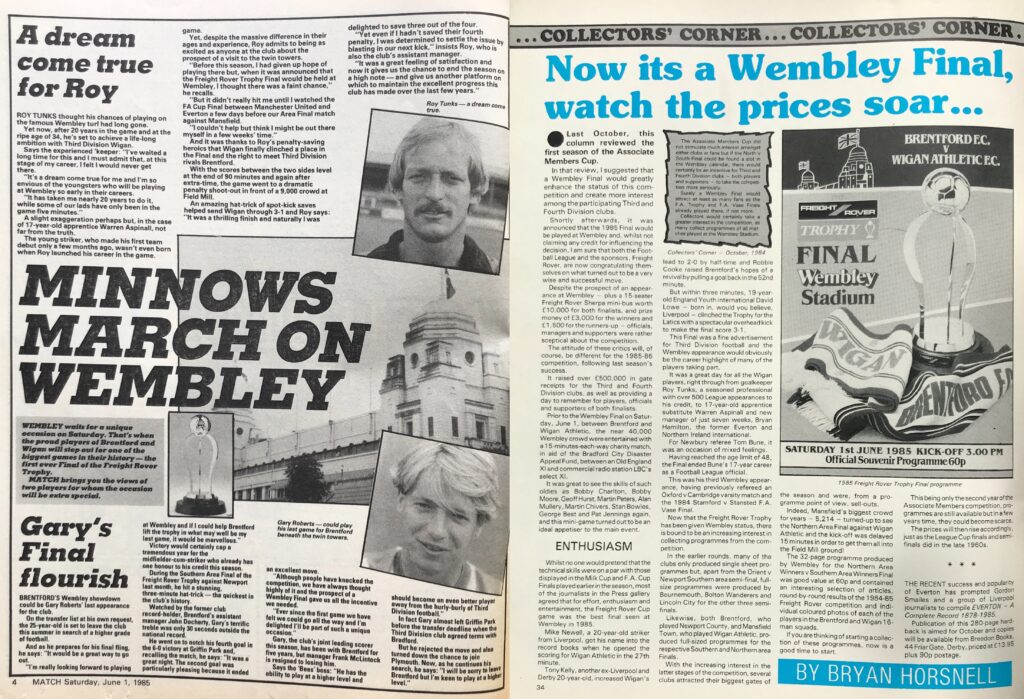
Wigan Athletic entered the Football League in 1978, when they were elected to the Fourth Division, replacing Southport. This was the last time that a club was elected to the League, with automatic promotion and relegation introduced for the 1986/87 season. Wigan had however already appeared at Wembley, losing the 1973 FA Trophy Final to Scarborough. Their first Football League promotion came in 1981/82, but it took until 2002/03 for the club to escape the bottom two divisions.
Springfield Park, built in 1897, was home to the town’s previous clubs, Wigan County, United, Town, Association and then Borough, who spent ten years in the Football League before liquidation in 1931. Wigan Athletic were founded the following year and moved to what was then called the JJB Stadium in 1999 before their meteoric rise to the Premier League. Losing finalists in the 2006 League Cup Final (at Cardiff), FA Cup glory at Wembley followed in 2013 as they beat Manchester City 1-0. 1985 saw a historic Wembley double for the town of Wigan, with this victory coming a month after the Rugby League club won the Challenge Cup in front of a nearly 100,000 crowd.
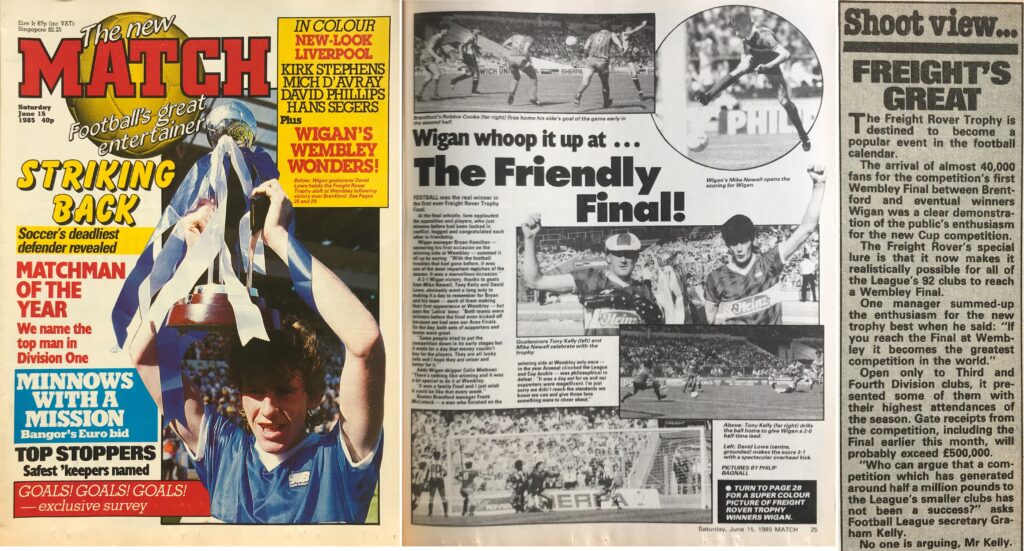
Brentford were founder members of the Football League’s Third Division in 1920, and reached the First Division in 1935/36, their fifth-place finish remaining their highest league position to date. Relegation immediately after the Second World War was followed by another in 1953/54, and Brentford spent nearly all of the next half-century in the bottom two divisions. The 1985 final was not the club’s first Wembley appearance, as they took part in the first-ever league game to be played there, when Clapton Orient were permitted to host two ‘home’ fixtures at the national stadium in 1930/31.
Brentford then lifted the London War Cup at Wembley in May 1942, beating Portsmouth with nearly 70,000 in attendance. Since 1985, they have returned for play-off finals and the 2011 EFL Trophy, having also reached the final ten years earlier, when it was played at Cardiff’s Millennium Stadium. Like Wigan, Brentford reached the Premier League after leaving their traditional home of Griffin Park, where they had played since 1904, winning the 2021 Championship play-off final on their most recent visit to Wembley.
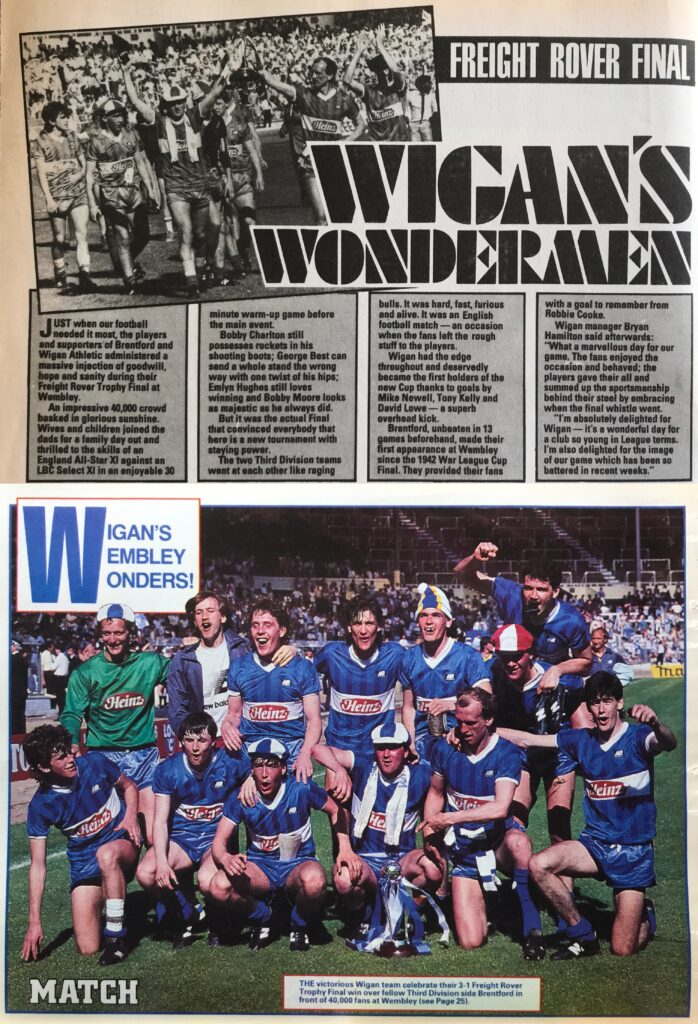
The Football League Group Cup was introduced in 1981/82 to replace the Anglo-Scottish Cup, with 32 invited clubs including First Division Notts County. It was won by Second Division Grimsby Town at their home ground of Blundell Park in front of a 3,423 crowd. The same format was retained the following season – featuring Norwich and Watford from the top flight – and the cup was won by Millwall at Lincoln’s Sincil Bank in front of an even lower crowd of just over 3,000. For 1983/84, the tournament was reorganised as the Associate Members’ Cup representing the Third and Fourth Divisions only. The final took place at Hull’s Boothferry Park, where visitors Bournemouth lifted the trophy, winning 2-1 with attendance up to 6,544.
1985’s first Wembley crowd of nearly 40,000 helped to establish the Associate Members’ Cup as an annual fixture. Over the season’s competition, more than £500,000 was raised in gate receipts for Third and Fourth Division clubs at a time of tight finances, especially at those levels. 80,841 later attended the 1988 final between Burnley and Wolves, setting a record only beaten when Portsmouth and Sunderland met in the 2019 final.
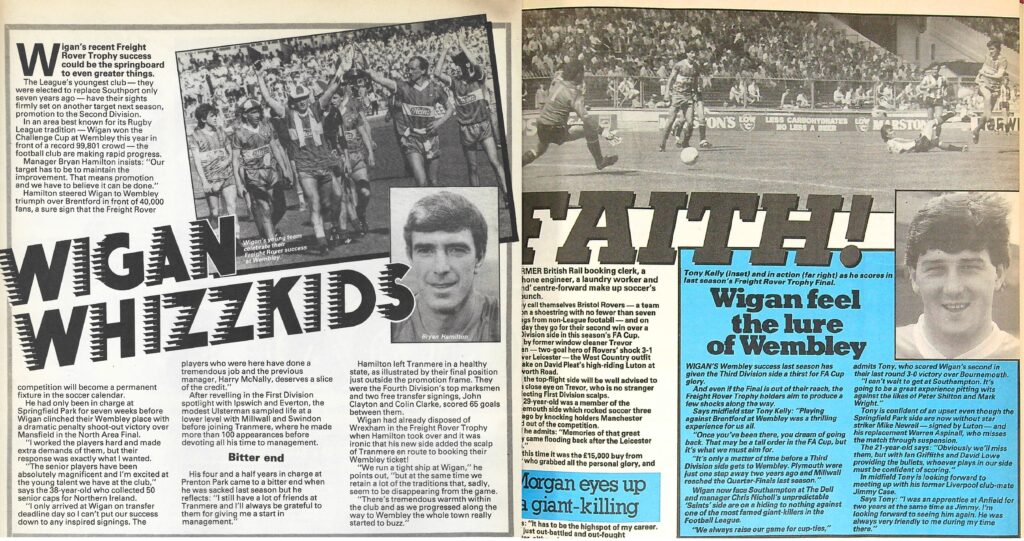
Developments in the Football League during the 1980s are one of the topics in my book Before the Premier League: A History of the Football League’s Last Decades.